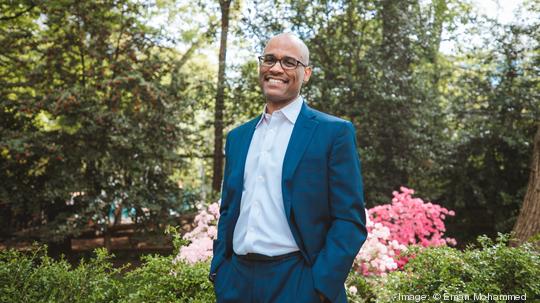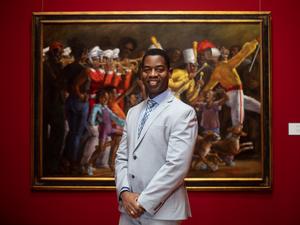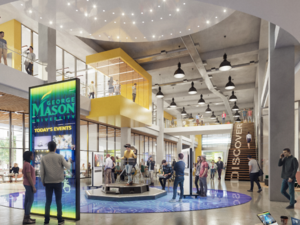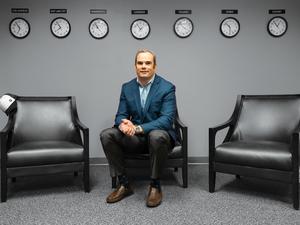
André Marshall likes to tell graduate students about his own journey in launching a startup based on fire-safety technology he developed.
“We thought we had a technology that was going to revolutionize the fire suppression industry,” said George Mason University's incoming vice president for research, innovation and economic development. "But it didn't."
The startup did score some wins. It partnered with a major insurance company and won a few contracts with the National Fire Protection Association. It caught the eye of a multinational security systems firm. Marshall and his co-founder thought they were going to be rich.
“After the CEO saw it, we were like, 'This is going to be awesome,'" Marshall said. "I started looking at townhouses in Old Town.”
But a deal ultimately didn't materialize, he said, and that’s OK. He's added it to the first-hand experience gained during his nearly four years as director of the National Science Foundation’s Innovation Corps, which helps academics commercialize their research.
Marshall will lean heavily on his I-Corps time as he transitions July 1 into his new roles at GMU, which also include president of the George Mason Research Foundation.
“I’m grateful to bring this lived experience,” Marshall said. “It’s this finger-tip feel for entrepreneurship, for research, and for what a federal sponsor is looking for that I’m excited to share with the faculty and administration at Mason.”
GMU has a significant role to play in Greater Washington's tech ecosystem. The school is building out a computer-science focused campus in Arlington and is set to receive $235 million from the state over the next 20 years to produce more tech-focused degrees — the most of any university besides Virginia Tech, which is standing up a $1 billion Alexandria graduate campus.
But, Marshall said he won’t settle for Mason just being just a significant player.
“If the enterprise scales in the way I’d like it to, we’ll move from being an important player to a central player in the innovation ecosystem,” he said.
Marshall said he intends to listen to faculty, industry and others in the GMU community before he decides how best to execute his role. But he talked some about his past work and how it could shape his thinking.
Research with a purpose
Marshall has a passion for "curiosity driven" research. It's one reason he left Rolls-Royce's research and development team for a job with the University of Maryland. His role at Mason will be to support faculty work in this regard and manage research awards.
On the flip side of that coin, Marshall has experience encouraging academics, as director of I-Corps, to get out of the laboratory and listen to potential customers.
"The reason most startups fail is not because their technology is bad, it's because they are working on something that no one cares about," he said. "It doesn't solve a critical problem or create a key opportunity, it's just a 'nice to have.' We train our researchers to get out of the laboratory and learn the market."
Workforce development
Marshall's Mason role will expand well beyond entrepreneurship and spinning out research. While companies will partner with GMU to develop new technology, most firms are really interested in workforce development. Preparing students for employment with tech companies such as Amazon.com Inc., which employs more than 1,000 people in Arlington as part of its second headquarters, with an ultimate goal of 25,000 or more, requires getting them involved in university research.
“Oftentimes the greatest way to translate technology out of a university and into industry isn't necessarily to license or patent them, but through hiring students who were working on the research,” he said. “That's something we have tried to emphasize in our industry collaborations at the NSF.”
Diversifying the tech industry
Marshall pointed to his work helping boost Black and minority entrepreneurship as an example of something else he'd like to accomplish at Mason. In fall 2019 he helped facilitate a partnership with the I-Corps program and the GEM Consortium fellowship.
The GEM fellowship model encouraged Black and minority undergraduates to pursue graduate degrees in science and engineering and set them up with an industry sponsor. Marshall said he benefited from that very program in the 1990s when he was sponsored by General Electric. But the economy changed rapidly and is now dominated by startups. The new partnership gave GEM fellows access to the entrepreneurial network and tools that NSF offers.
“One of the best things I’ve done in my career is connecting GEM and I-Corps,” Marshall said. “Both of those organizations gave me access, and I was able to connect them and address an urgent societal need for diversity in tech. So, I’m looking forward to doing more of that at Mason.”


